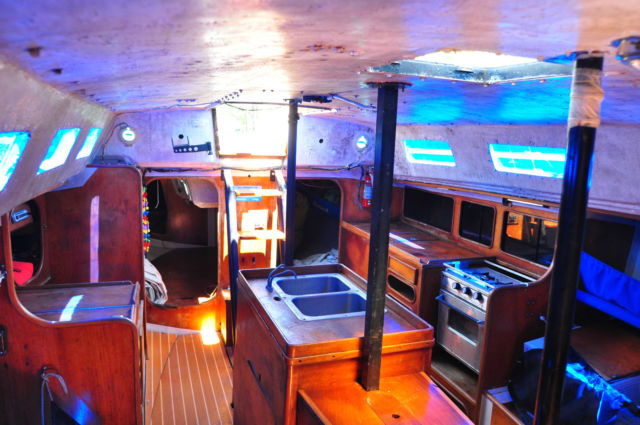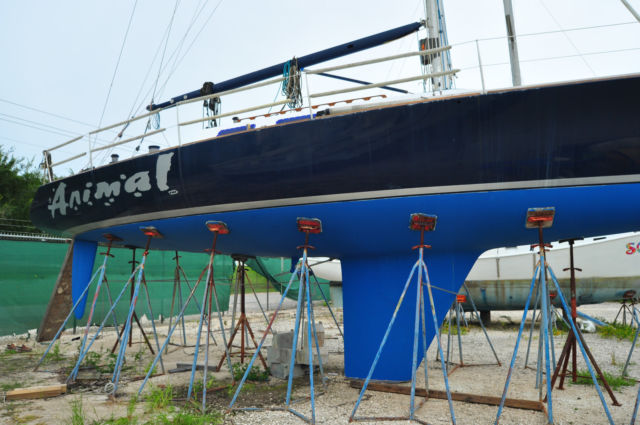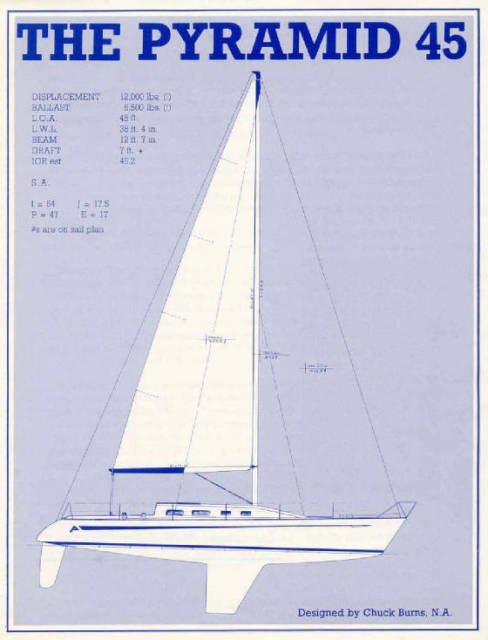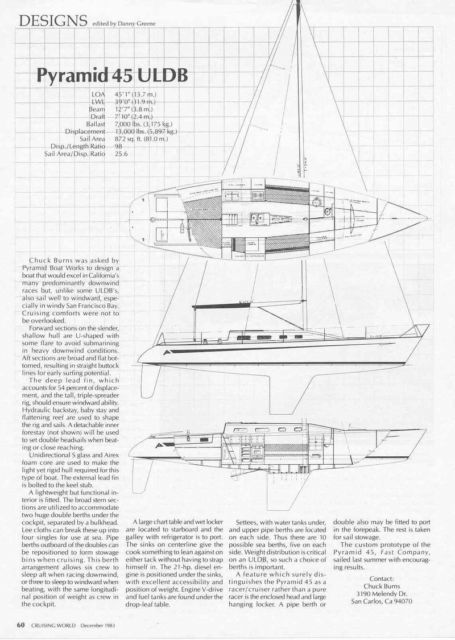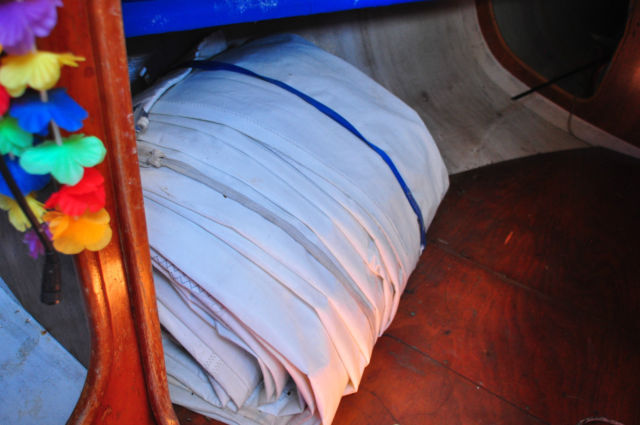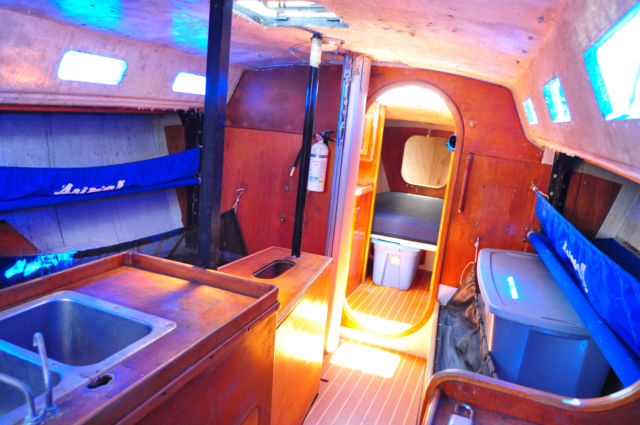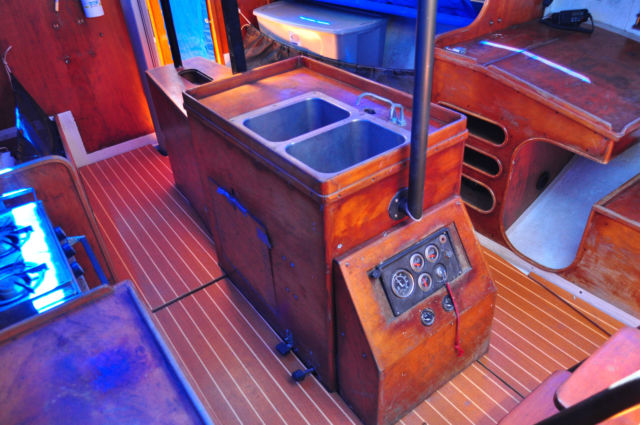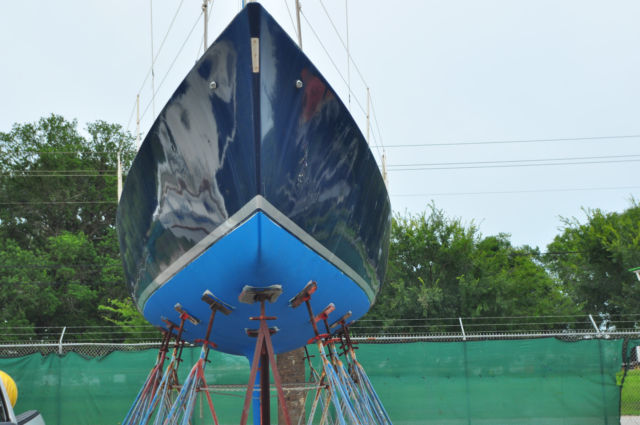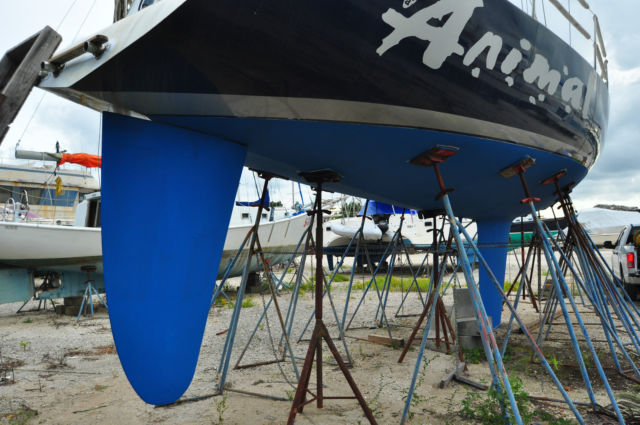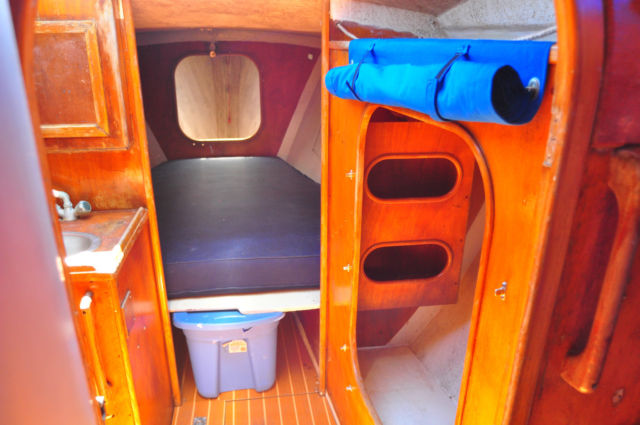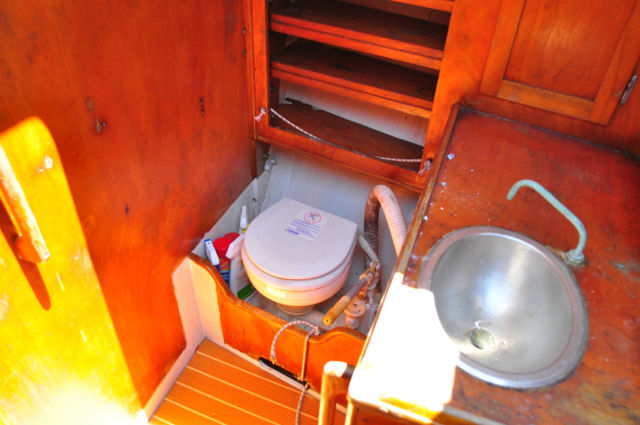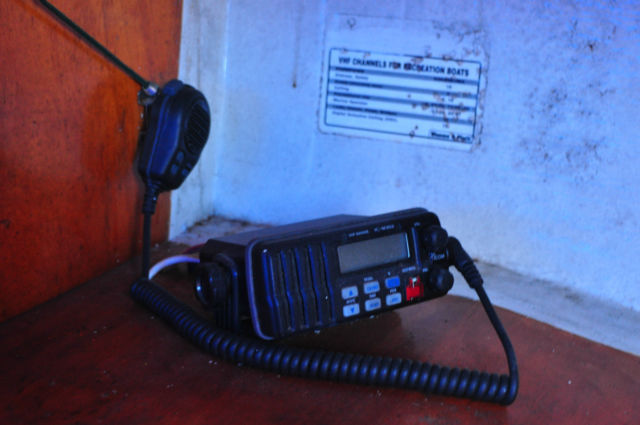amazing 45 ft bluewater racer cruiser sleeps 12 can owner finance above 14k
- Price: Contact seller
- Make: Chuck Burns Yachts
- Model: Pyramid 45
- Type: Cruiser/Racer
- Year: 1983
- Location: Pensacola, Florida, United States
Description
Boat is listed for sale though private brokers for $78,000 OBO, but we are kind of getting desperate to pay some overdue bills so we have dropped the Buy it Now Price here on Ebay to only $28,750 for a quick sale. That said, we reserve the right to end the listing at any time if it sells on the private market for a higher price. Replacement value for this boat is about $250,000 to $350,000. Replacement value is generally higher than actual market prices, but similar vessels in fully working condition typically sell for between $130K to $200K.For the right buyer who actually has the skills and motivation to complete the re-fit and put this fantastic boat back in the water, we are willing to discuss partial payment (down payment) of only $14K and finance the balance due over 2 years at six percent interest. Give a call to discuss the options if you want to discuss the possibilities.
$14K is what we absolutely have to get in hand right away to take care of urgent bills. You can pay that amount with Paypal if you need to use credit cards to do it or bank deposit or wire transfer if you have that much available from savings or whatever. If you want to owner finance the balance above the $14K we can do that for you and we will draw up an owner financing contract. We are doing this in hopes that someone with a good work ethic and a dream of serious sailing can buy this boat even if they don't have the full amount of the sale sitting in a savings account.
If you have questions to ask about the boat or the transaction, call me any time during east coast business hours. William 970 319-4361
If you are handy enough to do your own repairs rather than paying boat yard staff $80 hr etc, you could likely put this boat back together and get it a new paint job for 5K to $20K (go with white, the dark blue got too hot in the Florida sun and caused a few small paint blisters to form which is why it needs to be re-painted). Doing that will save you about a hundred thousand dollars to buy an equivalent modern racer/cruiser in "ready to go" condition. To adapt it to a live-aboard fast and comfortable world cruiser rather than a flat out racing machine will cost a bit more because you will want things like bigger water tanks, larger fuel tanks, wheel steering, solar panels and wind generator and hot water heater etc.
People who are used to seeing 30 foot project sailboats on Ebay for just a few thousand dollars may not understand the difference in getting into larger cruising boats. You are literally buying a floating house here that you can remodel and be comfortable in sailing anywhere in the world. Would you buy a house on land that didn't cost at least six figures, even if it was a fix-r-up-er? Boats are the same way. A true cruising boat is not a play thing for weekend sailing. It is a big and serious purchase. It is a "Yacht," and you will spend years of your life living in it "potentially" and its sailing characteristics will save you life now and then in big storms and deliver you from the agony of the doldrums by motoring quickly or save you from the big storms by being able to sail fast enough to out-race them.
Those are things that can not really have a price tag put on them, because it is your very own life we are talking about with such matters. But if you were to put a price on true safety and comfort, most people would say that is worth a few hundred thousand dollars. Most people who are serious sailors will spend as much on a boat as they can afford, whether that means $100K or a few million. If you plan to do serious cruising without spending at least high five figures to do it, you are probably getting in over your head and you will not actually go any further than the Bahamas before you give up the dream. That's fine. You can still be a fantastic and happy coastal cruiser and weekender with a $5K or $15K boat, but spend your first six months on the ocean in a $10K boat of any kind and you will be ready to come back to the good ol' continental USA to sell that boat, earn another fifty or hundred thousand bucks and get a better boat that really has the sailing performance and scale that you need to be completely comfortable.
Ask yourself, would you want to live in a ten thousand dollar house on the land? Probably not. So why would you trust your fate to a floating house that must cross oceans and survive storms and be comfortable at sea that costs less than a "land house."
This is possibly a once in a lifetime opportunity for a working person or a retiree without a huge 401K to be able to get a world cruising yacht that they could not otherwise afford by investing some of their own time in the restoration.
This is a huge and serious ocean sailing machine. It is aptly named "Animal." When it was launched it was hull #1 of famous yacht designer Chuck Burns trans oceanic Pyramid 45 design. You can see the photos of it and blueprints on the ChuckBurnsYachts website under Design Portfolio. This is the very same vessel that was formerly named "Fast Company" and competed successfully in many ocean races of the 1980s, 1990s and 2000s. Pyramid Yachts Inc. spent several million dollars developing this famous yacht and then sadly went out of business along with the vast majority of yacht makers when the new luxury taxes killed the yacht building business in the mid 1980s.
The Vessel has only one sleeping cushion in the front V Berth right now, but has space to accommodate sleeping berths for a crew of 12. It was intended for world wide ocean races with 12 crew people so there could be six crew on/ six crew off for 24/7 performance record setting just like Volvo Ocean 70 etc. For cruising though you can turn some of those extra crew berths into other kinds of stowage and the space you need to install more off-shore equipment and tanks. It includes four sails. They are believed to be in good operating condition but they are still in the bags and I did not want to try to lay out sails that size on the grass to check them and run the risk of a wind coming along. I believe the sails are two main sails and two genoas but again I am not certain since they are still in the bags (see photos). The boat has huge three speed primary winches (see photos with hand for scale) and smaller but still huge self tailing secondary winches. Each of these new would be several thousand dollars each and the sails also, if they are in good shape are worth several thousand dollars each. Instruments look good but are untested. Boat has a huge spinnaker pole with mounts on deck. Pole alone walking it out with tennis shoes seems about 22 feet long. Vessel also has the preferred racing style fore-sail dual track so you can hoist one sail while pulling another and never lose a millisecond of wind performance. Decks are solid and strong. Hydraulic boom vang and hydraulic back stay look very sexy and I was sad I didn't get to sail this vessel before selling it. The mast is a tapered and flexing triple spreader rig that is very impressive to stare up at and I am told performs accordingly. Rigging is corrosion free and very stout stainless cables. Marine folks who know the cost of this stuff will appreciate that the mast and rig alone on this boat would cost about $40K or more, and it seems to be in nearly perfect condition.
The only really important stuff to be done is the topsides paint has some bubbles in the paint job caused by the heat of the Florida sun on the current paint color which is a deep navy blue. People at the yard say the previous owners were warned not to paint it that color in the hot Florida sun but being Navy guys they insisted. Previous color was white and that's the color I would recommend changing it back to. Also the transmission was going to be replaced for their re-fit, before the primary partner in the racing team go deployed to the Middle East. The fuel tanks and prop were removed to put in a new transmission, but that work was never completed when he shipped out and they stopped racing. But his life-changing move can perhaps be what saves you a hundred grand and enables you to get this boat for dimes on the dollar.
My wife and I are serious blue water ocean sailors with thousands of miles and many years experience offshore and doing coastal cruising. It is our passion to help other people discover the sailing lifestyle, and especially the more serious cruising lifestyle. We already have our keeper boat and don't need another one, but every once in a while we discover through our friends and connections at boatyards a boat that is a terrific bargain that isn't getting the love and attention and exercise that it deserves, and we will try to help find a new home for it. This is one of those rare boats. If you want to call me and discuss your cruising or sailing plans and dreams and whether or not this boat might actually work to suit your needs I will be happy to speak with you and give you my honest opinion about the feasibility of your plans and whether this vessel might or might not work for you. Feel free to call and chat. William 970 319-4361
ATTENTION: THIS IS A SERIOUS LISTING FOR A SERIOUS BOAT. YOUR BUY IT NOW CLICK OR BEST OFFER IS A LEGALLY BINDING CONTRACT TO PURCHASE THIS SAILBOAT THE SAME AS A CONTRACT TO PURCHASE REAL ESTATE OR A NEW CAR. BY PLACING YOUR OFFER YOU AGREE TO THE TERMS OF THE AUCTION AND THE PAYMENT TERMS. PLEASE CONSIDER ALL OF THIS PRIOR TO CLICKING THE PURCHASE BUTTON.
PLEASE READ THE ENTIRE TEXT PRIOR TO MAKING AND OFFER AND MAKE SURE YOU THAT YOU HAVE AS MUCH INFORMATION ABOUT YOUR PURCHASE AS POSSIBLE. I AM HAPPY TO ANSWER QUESTIONS ABOUT THE BOAT AND YOU ARE WELCOME TO GO AND SEE IT IN PERSON PRIOR TO BIDDING IF YOU LIKE. CALL ME WILLIAM AT 970 319-4361.
PAYMENT IS DUE IN FULL WITHIN 24 HOURS. SEE PAYMENT TERMS. CLEAR TITLE IS AVAILABLE.
THE BOAT CAN REMAIN WHERE IT IS FOR THE REASONABLE MONTHLY STORAGE FEES AT THE BOATYARD.
MOVING A BIG SAILBOAT WITH A BOAT MOVER CAN BE VERY EXPENSIVE. OFTEN $4 OR MORE PER MILE. I AM HAPPY TO HELP YOU UNDERSTAND THE OPTIONS IN THAT REGARD IF YOU WANT TO GIVE ME A CALL. THIS BOAT COULD ALSO BE MOVED BY WATER, WITH ONLY A FEW PREPARATIONS FOR RE-LAUNCH, IF YOU ARE A DECENT SAILOR AND HAVE A COUPLE GOOD CREW PEOPLE TO GO WITH YOU.
We may be able to consider partial financing or partial trades with a significant down payment, but we would have to discuss this on an individual case basis. Please call to talk if you have anything like that in mind.
AND NOW IF YOU AREN'T YET TIRED OF READING A FEW INSIGHTS TO SHARE ABOUT BUYING BOATS AND CHOOSING THE RIGHT BOAT FOR GLOBAL CRUISING:
A little about us.
Our passion is to assist folks who are making a transition from day sailing or coastal cruising to becoming full-time live-aboard world cruisers. We also assist new sailors who are just getting into the sport of sailing by advising them on how to develop their skills and how to make plans to pursue the dream of cruising and world traveling full-time.
We have extensive contacts and resources for finding good world cruising boats at far below their fair market value, and occasionally we discover an amazing neglected vessel at a price that we know may enable a cruising family or a retired couple on fixed income the ability to pursue the dream of cruising without the sort of means and savings normally associated with pursuing this lifestyle.
In those cases, like this boat, we work to try and find a new home for a good “below market value” boat, with people who will fully restore the vessel, and hopefully use it for the serious cruising that the boat was designed for.
There are many aspects of life where experience really matters, but none so much as global cruising. When you are planning to take a small boat across vast oceans and visit foreign ports of call on your own terms you must truly learn to become Master's of your Own Destiny. It doesn't matter how wealthy you are or how talented you are at managing large organizations or companies with dozens of staff people.
When you are on a boat in the middle of the ocean, the choices you have made, the choices you will make and your own internal skills and the undeniable truth of how well or poorly you have planned for your expedition, are the factors that will determine whether your experiences become a positive adventure or a frightening (or even life threatening) catastrophe.
When you are looking at a boat parked peacefully at a dock or on jack stands at a boat yard, you will be tempted to judge it based on whether the lines are nice and whether it is pretty or ugly and whether it is new or old and well kept or run down.
The ocean however, operates according to immutable laws of physics. The ocean does not care whether it sinks a pretty boat or keeps an ugly one floating. It does not care whether you are a skilled sailor with dozens or years experience under your shade hat or whether you are an amateur on your first weekend pleasure cruise. You will be served exactly the same conditions of wind and waves whether you were born wealthy or if you were raised in a cave by baboons.
The only control you have over these situations is knowing when to sail and when not to sail, and you can prepare yourself so that when the wrong situation strikes, if it ever does, you are skilled and prepared to deal with it and have a vessel that is prepared to handle the same.
For people who are wanting to go cruising full-time, or who want to go from being pleasure sailors to competent seamen and seawomen, choosing the right boat is the first and sometimes ultimately most important decision of their nautical lives.
Of course you can always sell or trade a boat and then buy a different one, but still the choice of each boat will influence the experiences you have and it will determine in many ways the capabilities or limitations of what you can or can't do while you have that boat for your home—even if it is only home for a few weekends here and there.
There are many nuances and subtleties to sailing, as well as to each individual vessel. A boat that may be just exactly perfect for one sailor or family of sailors, may be completely the wrong boat to suit another person's dreams.
By nature, boats require a lot of maintenance and upgrades, and if you are someone who wants all the possible bells and whistles, boating can be a very expensive occupation.
However, there are also ways to save a lot of money and still pursue the dream effectively and safely and create a new floating paradise for yourself. But each person or each couple's needs are different.
There is no such boat as a boat that is not a project boat.
Long before we were married, when my wife was only 12 years old, and her father (a relatively wealthy man at the time) purchased a brand new Beneteau 46 for the family to live on for years and to cruise the world on, the first thing he did to a brand new half million dollar boat was to spend another $27K on equipment upgrades, new electronics installations and custom modifications.
The reason he did that is because no boat, no matter how shiny and brand new, is exactly right for everyone's individual tastes and needs, and no boat comes straight from the factory completely ready to do anything other than Wednesday afternoon beer can races.
I often get asked by people who are shopping for a used boat to go cruising the world, “Is this boat ready to cross the Atlantic?” or “Does it need anything before it is 'Ready to Sail.”
The very nature of that question is a showcase of their naivety. Even if the answer were “Yes, the boat is ready.” (which would be impossible to have any boat ready unless you have spent thousands of dollars on a cruising chandlery and provisioning service ahead of time) the greater question is “Are such ignorant sailors who need to ask such questions ready themselves?”
Even if they had the absolutely perfect boat, prepared ahead of time by die-hard professionals to get it ready to cast off the lines and sail to points distant and exotic, would the sailors know where everything is at on the boat and how to operate those systems and how not to break them with ignorant mistakes or how to fix them once broken? And if they knew all those things, would the boat be equipped with the necessary repair tools and supplies as part of the process of getting it ready to sail?
So all these are big questions, and the only easy answer is that any sailor must become intimately familiar with their vessel prior to making long voyages beyond sight of land. The easiest way to become familiar with a boat so that it is not a stranger but rather a trusted old friend is to do a lot of weekend coastal cruising with it, while you work all the bugs out. Also, the more projects and upgrades you do yourself the more familiar you will be with how they work, how to maintain them and how to fix them again if anything every goes wrong. To depend on the expertise of professionals left behind in a port in a distant country you cleared out of months ago is only to invite future disaster...and its also much harder on the wallet.
So any time you can add to your own skills and knowledge of your own boat by doing your own work, or hiring a professional to help you do it yourself, you are preparing yourself for future success as a cruiser.
Any boat, even a brand new boat, will have things about it that you want to change or upgrade or move or install prior to making long voyages.
The better questions to ask are:
“What is the proper amount of maintenance and upgrades that I will make to my vessel prior to setting sail?
How many things need to be changed or fixed before I leave the continental US?
How many projects will I work on, as little projects along the way, when I have a slow day at a boring anchorage and there are no cruiser parties to attend and no interesting conversations of the side channels of the VHF.
How many projects are absolutely vital to get accomplished before I begin actively using the boat as a full time residence and a floating RV that can sail to any country with a coastline?”
How many projects do I want to tackle myself if it means I can save literally tens of thousands of dollars on the purchase price of a boat, and how much more ultimate value do I get for my money by buying a larger or more seaworthy boat with a few bigger projects to tackle than if I buy a smaller or more flimsy boat that is cleaned up nicer and has fewer problems to address. (Remember the ultimate cosmic law of boating – even if you can't see any problems at all with a boat, and no projects needing doing, as soon as you own it and begin to sail it, you will start to find those quirks and bugs) So don't fool yourself into believing that you can simply buy a shiny new boat from a broker at full market value, or even by paying more than boat blue book value, to avoid ever having to make repairs or upgrades.
Any experienced sailor or boating professional other than someone selling fancy new boats will admit to you that there is no such boat other than a “project boat.” The only question is “What are the projects and how much money will I save by doing them myself versus hiring someone else to complete them?”
Every boat that I have ever bought or ever sold, which is now many dozens of them, had varying degrees of things needing to be improved about it. Even the brand new boats straight from the showroom floor or boat show sales dock will need bottom painting and new zincs and fuel cleansing treatments and oil changes and manifold and riser inspections within a matter or months of casual weekend use.
The longer any boat sits without the proper level of loving regular maintenance the faster it will deteriorate, and tiny 15 minute projects will turn into hour-long projects and hour-long projects will turn into day-long or week-long projects due to continuing neglect.
The quality of the build is also important. A cheap boat will have cheap boat problems, and it will have serious issues far faster and more frequently than a very well built boat from an esteemed yacht designer and builder even if the better boat looks worse initially.
In many ways you are better off to buy an older and more well regarded vessel in worse “first impressions” condition than to buy a shiny and well kept cheaper new boat. In the long run the better boat will cause far fewer headaches once you have it restored fully and you are taking care of it yourself, whereas the cheap but glossy boat may still look new and shiny for years, but begin having serious and costly problems that cannot be seen even while it still looks great in Facebook boat pictures.
Boating is like riding a horse or driving a high performance sports car. You always have to be involved in the life of your boat whether you use it frequently or not.
But this is not a bad thing, because it is part of the pride of ownership, and the regular maintenance and upkeep and small projects is what enables you to avoid the big ones or to at least know which big ones you need to do sooner and which ones can wait till later.
--
As you will guess by now, I'm a bit of a philosopher sailor when it comes to helping folks find just the right boat to serve their needs.
I am currently writing a book on that very topic which will be called, “The Seven Questions of Cruising (or) the Seven Questions you should ask yourself before buying a Boat.” Here is a quick preview of the questions you should be trying to answer from the introduction to my new book.
--
When you go to buy a boat, especially if it is your first boat, there are a lot of decisions to be made and hard choices to figure out.
Before you begin searching for the correct vessel to serve your needs, you need to first ask yourself, (and your cruising partners/ spouse etc) some important questions which will help you immensely in the quest to find the perfect small ship to suit your needs.
Question # 1- Where do you want to sail to (now and also possibly in the future)?
#2 – Who might be going with you and/or who might want to visit you and stay on the boat with you once you get to that exotic foreign port (if global cruising is your goal) or that incredible weekend getaway spot (if weekend cruising is your thing).
#3 – How much do you want to spend on this adventure called boating/sailing/?
Also, how much “can” you afford to spend if you happen to take a wrong turn with the adventure and “need” to spend more money to fix a problem or get yourself or your stalwart side-kick (your boat) out of trouble?
#4 – How handy are you? (i.e. - Are you someone who naturally takes pride in your ability to figure it out yourself, or are you the person who would rather call an “expert” and pay them to solve whatever problem you are having?
#5 – How much time do you have to save yourself money, because in sailing, as well as in life in general “time often equals money.”
#6 – Are you a weekend warrior and/or charter sailor, or do you want to cruise full time?
#7 – Do you care more about Getting There or more about “Being There” once you have arrived?
This boat is a boat that needs some basic skill level improvements and restorations, but nothing that can't be done by a person with average handy skills over the coarse of a few weekends while they are taking breaks in between weekend sailing trips.
All of the important structural and mechanical systems necessary to basic wind powered sailing are working fine on this boat from everything I can tell doing basic inspections and from the testimony of the previous owner. The lines are grey with mildew from sitting and may need some of them replaced, but on quick inspection most of them seem structurally strong.
However,since I have not personally sailed on it and it has been on jack stands for the last two years it is being sold AS IS. The motor has surface corrosion from salt water mist and splashes during big ocean races so it doesn't look new and may need some new parts after sitting, but I am told by marina staff that the motor was running when it was last used two years ago. However, the fuel tanks have been removed to replace the transmission and it needs a new prop and tranny before you can use it, assuming the motor is still fine on the inside. (in other words, the mechanical system needs some work to put it all back together and it is even possible that while it was sitting on jack stands new issues could have possibly developed with mechanical systems or the electronics etc). However, since you may be able to save over a hundred thousand dollars on the purchase of this boat over fully restored condition (assuming it sells for less than the $78K Buy it Now Price) there should be room in your budget for a few upgrades and repairs.
If you wanted to sail it tomorrow all you would need to do is install an outboard motor bracket on the stern with a 15 hp or larger motor to help you get back in and out of the marina. This boat was originally designed as a Thoroughbred Racer type of boat, so it will need a few modifications to make it more comfortable if you plan to use it as a full time long distance ocean cruiser for pleasure sailing and living aboard. But the hull and interior will suit themselves very well to that if cruising is more your dream than racing, but it will take more modifications and re-modeling to truly be comfortable.
I hope it goes to a good home. Call me if you want to arrange to go and see the boat in person or if you have any other questions about it. Remember, payment is due in full within 24 hours for at least the $14K. Beyond that payment we can take monthly payments at 6% as stated before.
Thanks, William 970 319-4361
I have another couple dozen photos which I can't post to the auction because Ebay limits it to 24. If you want to see the rest of the pictures give me a call and you can give me your email address that way. Also I will try to type out the text from the original sales brochures for folks to read that also if I can find enough time the next few days. Check back for that.
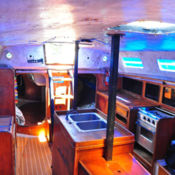 no resrve 45 ft bluewater racer cruiser sleeps 12 will owner finance above 14k
no resrve 45 ft bluewater racer cruiser sleeps 12 will owner finance above 14k
Make: Chuck Burns Yachts
Model: 1983
Length: 45
Location: Pensacola, Florida, United States
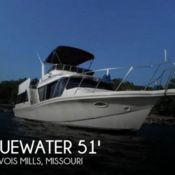 1989 bluewater coastal cruiser 51 used
1989 bluewater coastal cruiser 51 used
Make: Bluewater
Model: 1989
Location: Gravois Mills, Missouri, United States
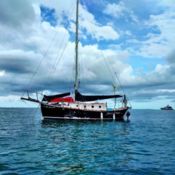 Aquarius 24 Piolet Cutter Bluewater Cruiser
Aquarius 24 Piolet Cutter Bluewater Cruiser
Make: Aquarius
Model: 1982
Location: Key West, Florida, United States
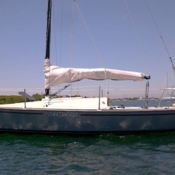 1981 J/24 Racer-Cruiser "Gunsmoke"
1981 J/24 Racer-Cruiser "Gunsmoke"
Make: J/24
Location: New Rochelle, New York, United States
 Cal 35 MK II Sailboat - Fast racer/cruiser
Cal 35 MK II Sailboat - Fast racer/cruiser
Make: Cal
Model: 1981
Location: New York, New York, United States
 TRIPP 37 -- 37 foot cruiser racer
TRIPP 37 -- 37 foot cruiser racer
Make: Holby Marine Company
Model: 1989
Location: New Rochelle, New York, United States
 1975 Contessa 32 classic cruiser/racer
1975 Contessa 32 classic cruiser/racer
Make: contessa
Model: 1975
Location: Moore Haven, Florida, United States
 Electric 26 foot sloop Sailboat, cruiser/racer
Electric 26 foot sloop Sailboat, cruiser/racer
Make: Mirage Yachts Ltd (CAN)
Model: 1978
Location: Cataumet, Massachusetts, United States
